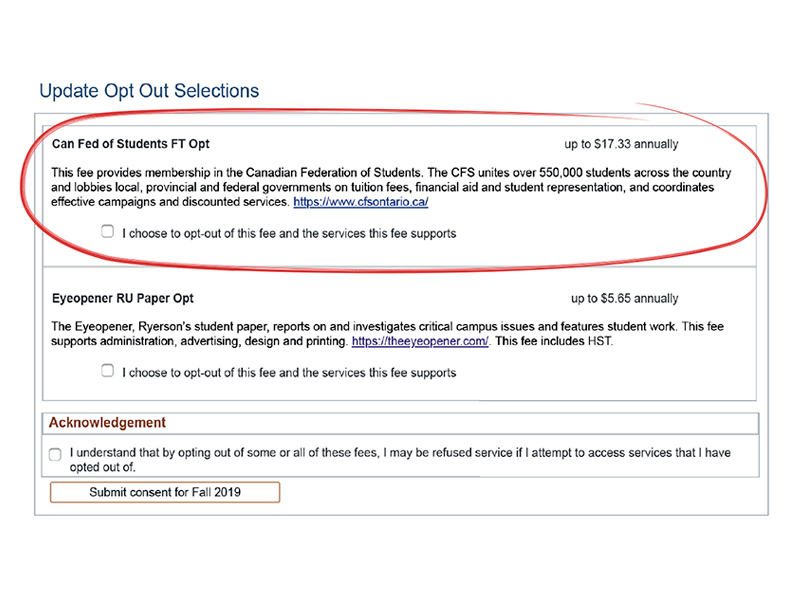B’nai Brith Canada has been granted intervener status in a court case between the Canadian Federation of Students (CFS) and the York Federation of Students on one side, and the Government of Ontario on the other. The two student groups are challenging the government’s Student Choice Initiative, which allows those going to university to opt out of fees for certain non-essential campus programs and services – including funding for CFS.
The challenge, which was filed in May, will go to court on Oct. 11. B’nai Brith will argue in defence of the initiative, because the CFS supports BDS and B’nai Brith believes Jewish students should have the right to choose if they want to give money to an organization that goes against their values.
“B’nai Brith will proudly defend the rights of all Ontario students to have the freedom of choice and freedom of conscience not to be forced to support any group that goes against their fundamental values,” the organization wrote in a statement.
The statement described BDS as “a policy that thousands of Jewish students in Ontario and beyond feel incites discrimination against them on their campuses.” The statement also noted that the CFS website lists groups such as Faculty for Palestine and the Coalition Against Israeli Apartheid among its “Solidarity Partners,” and that B’nai Brith was part of a campaign over the summer to encourage Jewish students to opt out of funding CFS.
According to its 2019 annual report, CFS represents over 350,000 students at Ontario post-secondary institutions. CFS executive director Justine de Jaegher said losing funding will mean that the organization, and other groups whose fees are deemed non-essential, may no longer be able to support students as effectively.
“We think (the Student Choice Initiative) is harmful, because we don’t want to see budgets for important services for students cut,” she said.
“Be they students unions who operate health and dental plans for students, bus passes, service centres like women’s centres, LGBTQ centres, racialized student centres. We think that by making all of these fees optional, you’re really putting these kinds of services at risk and creating a lot of uncertainty in terms of establishing their budgets from year to year.”

De Jaegher said CFS is challenging the Student Choice Initiative on two grounds, which she termed “improper purpose” and “improper authority.”
In terms of improper purpose, de Jaegher said CFS believes the Ontario government did not actually create the initiative to give students choice, as the vast majority of ancillary fees remain mandatory, but rather to defund those services that promote student advocacy, which also includes campus media like newspapers and radio.
“This policy is a direct attack on students’ ability to organize and provide essential services on campus,” said Sofia Descalzi, the CFS’s chairperson, in a press release issued May 28. “It is a clear attempt to silence students’ unions and student organizations who have a long history of holding administrations and governments accountable when it comes to creating accessible, affordable and safer campuses.”
When it comes to improper authority, de Jaegher said CFS believes the minister responsible did not have the power to unilaterally impose the policy on post-secondary institutions. She said universities have historically been autonomous from the province when it comes to signing agreements with student groups, and that colleges are governed by a provincial act that says the government will not interfere in their ability to sign such agreements.
De Jaegher said she is disappointed to see so many Jewish groups opposing their work and supporting the student choice policy, especially because the CFS is rolling out a “revitalized” campaign against anti-Semitism on campus. Included in that campaign, she said, are tools for student unions and organizers to advocate on issues such as holiday accommodations, hate speech, prayer space and Quebec’s Bill 21.
When asked to respond to those who say that BDS itself is anti-Semitic, de Jaegher said supporting it was a democratic decision, and also that many Jewish student activists support BDS and believe that conflating it with anti-Semitism is itself offensive.
“We don’t want to treat Jewish students as a monolith on this issue, because they’re not. There’s a variety of views on it,” she said. “And many of them did inform the democratic decision that was made around the policy.”
However, Michael Mostyn, CEO of B’nai Brith Canada, said that, “There are certainly some Jewish people who support BDS, but I wouldn’t say many. BDS has been widely recognized as an anti-Semitic movement.…
“The Canadian and Ontario governments have both recognized BDS as anti-Semitic, so it’s not in dispute.”
